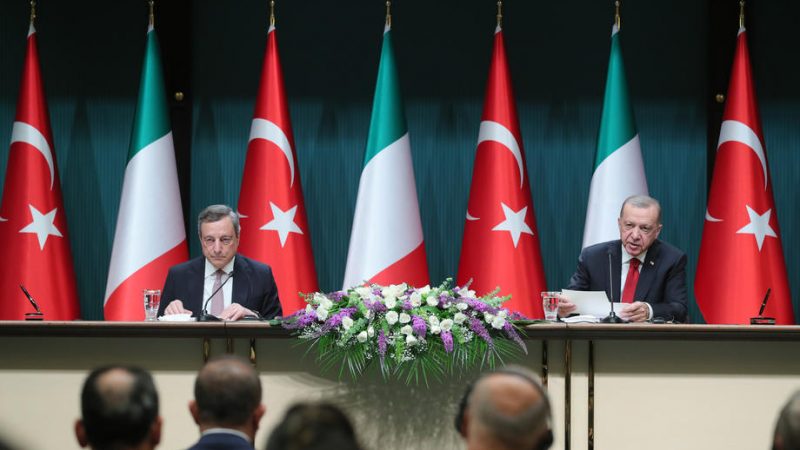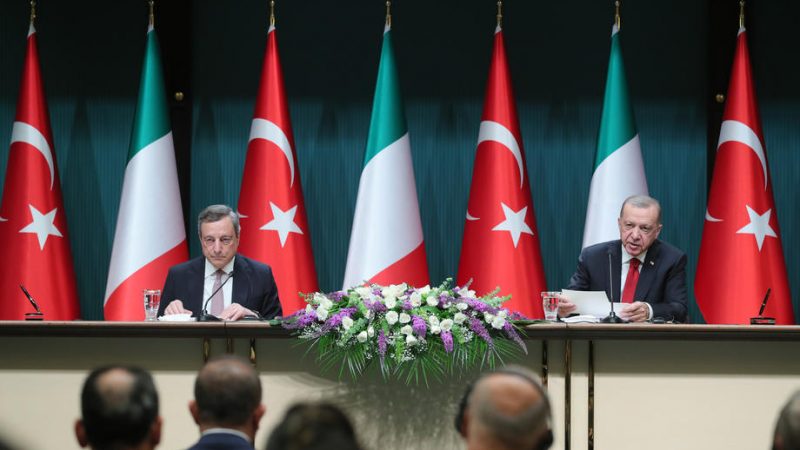Address
304 North Cardinal St.
Dorchester Center, MA 02124
Work Hours
Monday to Friday: 7AM - 7PM
Weekend: 10AM - 5PM
Address
304 North Cardinal St.
Dorchester Center, MA 02124
Work Hours
Monday to Friday: 7AM - 7PM
Weekend: 10AM - 5PM


Turkey has recently been at the centre of diplomatic efforts, mostly revolving around the Russian invasion of Ukraine. Since hostilities broke out in February, Ankara has hosted representatives of several countries of the region and Turkish President Recep Tayyip Erdoğan has met world leaders at venues such as the NATO Summit in Madrid on June 28-30.
The crowded diplomatic agenda has included the third Turkey-Italy Intergovernmental Summit on July 5. Italian Prime Minister Mario Draghi has been received by Erdoğan in Ankara, ten years after the second edition was held in Rome in 2012. Draghi has led a crowded delegation, composed of five ministers, to meet the Turkish president and their counterparts. The two sides discussed several issues ranging from the repercussions of the current Ukrainian crisis, particularly on oil and grain supplies, to migration and the situation in Libya. The North African country has recently been rocked by street protests that could threaten the fragile balance of power. Italy and Turkey have thrown their support behind the Tripoli faction and support Prime Minister Abdul Hamid Dbeibeh. Turkey is, together with Russia, also the only foreign power with troops on the ground in the country. Moscow is backing the Tobruk faction led by General Khalifa Haftar and by Fathi Bashagha, who has also been appointed Prime Minister in March 2022. Among several foreign and local players struggling for power – including Turkish and Russian troops, various militia groups and regional powers such as Egypt and the United Arab Emirates – Ankara is the main player on the Tripoli side and the potential kingmaker in the Libyan scenario. This circumstance and Italy’s preoccupation with the internal situation of its southern neighbour – particularly concerning migration and energy supplies – certainly encouraged the two countries to enhance cooperation in the central Mediterranean sector.
The summit has set important guidelines for future Italo-Turkish relations in the 2020s. A series of agreements and memoranda of understanding have been signed on a wide variety of topics, ranging from accepting mutual driving licenses to improving trade relations. Trade volumes between the two countries have steadily increased in recent years, reaching €19.4 billion (+27,7%), with Italian exports valued at €9.5 billion (+23,6%), making Turkey Italy’s main partner in the Middle East region. Data from the Turkish Ministry of Trade estimates that over 1500 companies operate in Turkey with Italian capital (€6 billion in Italian investment). More importantly, cooperation has deepened in the fields of foreign policy and defence. A new mechanism for direct consultation at the top ministerial level has been introduced by the two Foreign Ministers Luigi Di Maio and Mevlüt Çavuşoğlu. In the realm of defence, Hulusi Akar and his Italian counterpart Lorenzo Guerini have agreed to protect classified information regarding industrial development and defence procurement.
The meeting has been characterised by a cordial atmosphere in stark contrast to the heated declarations of April 2021, when Draghi called Erdoğan a dictator, prompting an angry reply from Ankara. The two sides seem now more inclined to further their interests and cooperation rather than stress their differences. As the two leaders have stated, Turkey and Italy are “partners, allies, friends”. This change of stance reflects shifting regional priorities due to the impact of the war in Ukraine. In its quest to diversify natural gas and oil supplies away from Russia, Italy has been courting other oil rich countries in the region and beyond. Most recently, Italy has reached a deal with Algeria for 30 billion cubic metres (bcm) of natural gas. In this energy perspective, Turkey’s role and position have great potential, being the link from the Trans-Adriatic Pipeline (TAP, running from Italy to the Greek-Turkish border) with the Trans-Anatolian Pipeline (TANAP), and thus giving access to the Caspian gas reserves of Azerbaijan (Shah Deniz).
Moreover, Ankara, as noted above, has become a diplomatic protagonist of the current showdown between the west and Russia: Turkey is a NATO member, has not imposed sanctions on Russia, openly dialogues with both warring countries, and controls access to the Black Sea. This position of newfound centrality has also been evident during the NATO summit in Madrid on June 28-30. In the Spanish capital, Erdoğan has quite successfully achieved his goals, lifting his veto on Sweden and Finland’s NATO candidacy on condition that the two countries cease their support to Kurdish separatists and lift the arms embargo on Turkey. The meeting between US President Joe Biden and Erdoğan in the same venue is another sign that Turkey and its president are willing to capitalise on this occasion to turn Turkey into a key actor in solving the ongoing conflict. The recent agreement brokered with Russia to lift the blockade on wheat shipments waiting in the port of Odessa, which, if successful, would help alleviate the dire food insecurity worsened by the war, is only the latest example of Ankara’s centrality.
For Turkey, Italy’s importance lies in her location in the central Mediterranean but more importantly in its membership in the European family. Ankara’s position under the spotlight alone is not enough: Turkey needs to mend ties with Europe after a period of strained relations. The recent tug of war between Turkey and the two Scandinavian countries is just the latest example of a working relation characterised by a lack of trust. In the mutated political landscape, a deeper cooperation is recommended to placate the effects of the spill over from the war. The Turkish Italian summit has set important guidelines in this direction. And although Draghi has resigned on July 21 following a political crisis in his government and Erdoğan risks not being re-elected in next year’s election in Turkey, the mechanisms established and the agreements reached between the two countries have the potential to drive bilateral relations for the upcoming years even after the eventual departure of the two leaders.